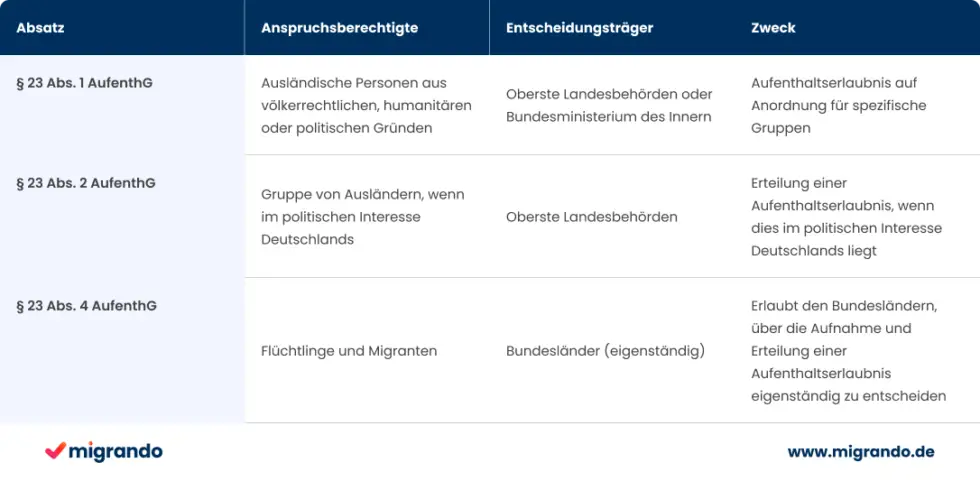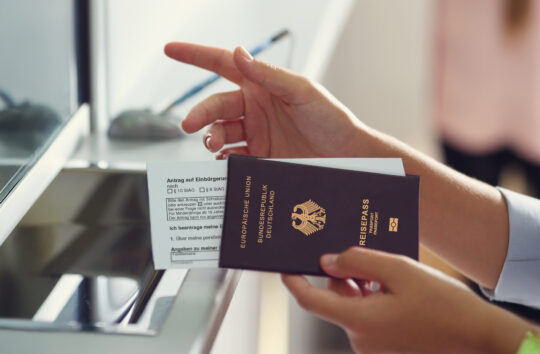What is § 23 AufenthG and why is it important?
Section 23 of the Residence Act (AufenthG) plays a key role in German migration law. It authorizes the highest state authorities to grant residence permits to larger groups of foreigners for reasons of international law, humanitarian or political reasons. This provision is particularly important as it:
- offers flexibility in the right of residence,
- humanitarian support in crisis situations,
- and paves the way for the integration of foreigners in Germany.
Section 23 of the Residence Act thus creates a basis that makes it possible to respond to individual and global challenges with humanity and the rule of law.
The historical development of Section 23 AufenthG
The emergence and evolution of Section 23 AufenthG reflects Germany's response to changing global migration movements and political landscapes. Originally introduced to offer protection to specific groups in emergency situations, the paragraph has undergone several changes over the years that have increased its scope and effectiveness. The most important milestones are:
- Introduction: Date and circumstances of first incorporation into law.
- Changes: Significant legal amendments that have expanded the scope and target groups of Section 23 AufenthG.
- Current significance: The role of the paragraph in Germany's current migration policy.
These developments show how Section 23 of the Residence Act has gained in importance as an instrument of German migration policy, particularly with regard to the protection and integration of refugees and migrants.
Settlement permit with § 23 AufenthG?
Basics of § 23 AufenthG
The various paragraphs of Section 23 AufenthG explained
§ Section 23 of the Residence Act is divided into several paragraphs that define different requirements and procedures for granting residence. Here is a clear explanation:
§ Section 23 (1) is aimed at foreign nationals for reasons of international law, humanitarian or political reasons and allows the highest state authorities or the Federal Ministry of the Interior to grant them a residence permit. An important addition to this is the declaration of commitment in accordance with Section 68 Residence Act, which enables individuals, associations or other organizations to cover the living costs of persons entitled to protection.
§ Section 23 (2) refers to the possibility of granting a residence permit to a group of foreigners if this is in Germany's political interest.
§ Section 23 (4) enables the federal states to decide on the admission of so-called resettlement refugees on their own authority and to issue them with a residence permit.
These distinctions are essential in order to understand the legal framework for the reception and integration of migrants and refugees in Germany.
Federal vs. state recording: a clear distinction
The admission of foreign nationals under Section 23 AufenthG can take place at both federal and state level. This distinction is of central importance:
Federal admission: The Federal Government, represented by the Federal Ministry of the Interior, makes a decision on the admission of refugees or migrants on humanitarian grounds, which then applies nationwide. The Ministry then orders the distribution via the Federal Office for Migration and Refugees.
State admission: The individual federal states can decide independently on the admission of persons. This allows the federal states to react flexibly to specific humanitarian situations. The decision-maker is the highest state authority.

Who can apply for § 23 AufenthG?
The provisions of Section 23 AufenthG are applicable to a wide range of situations and offer various groups of people protection and the possibility of legal residence in Germany. The applicability of this paragraph depends on the specific requirements and the respective paragraphs that are being focused on.
Special consideration: Refugees and resettlement programs
A special focus within Section 23 of the Residence Act is on refugees and resettlement programs. These programs are specifically designed to offer people in need of international protection a new home. The generic term is the resettlement of people seeking protection. Here are some key aspects:
Target groups:
- Refugees who are unable to return to their home country due to war, persecution or other dangers.
- Persons within the framework of resettlement programs who are admitted to Germany on the basis of a selection according to specific criteria of a humanitarian nature.
Prerequisites:
- Recognition as a refugee under the Geneva Refugee Convention or similar international agreements.
- Selection within the framework of resettlement programmes carried out in cooperation with international organizations such as the UNHCR.
- State registration programs of individual federal states.
Procedure:
- Application by or on behalf of the person concerned, often in cooperation with international organizations.
- Examination and selection based on the criteria of humanitarian necessity, integration ability and other relevant factors. The BMI forwards a regulation to the BAMF and the BAMF implements the regulation and decides who is selected.
Procedure for obtaining the residence permit
Application procedure for a residence permit according to § 23 AufenthG
The application procedure for a residence permit in accordance with Section 23 AufenthG is an orderly process aimed at providing the persons concerned with a legal basis for their stay in Germany. The steps include:
- Application: The first step is to submit a formal application to the responsible Foreigners' office.
- Examination of the requirements: The authority checks whether the applicant fulfills the specific criteria according to § 23 AufenthG.
- Decision-making: Based on the examination, the authority makes a decision on granting the residence permit.
- Issuance of a residence permit: If the decision is positive, the applicant receives a residence permit that legalizes their stay in Germany.
Required documents and prerequisites
Certain documents and requirements are necessary to successfully complete the application process:
- Valid passport: A current and valid passport is required to prove the identity and nationality of the applicant.
- Proof of fulfillment of the admission requirements: Depending on the specific basis of section 23 paragraph, various documents may be required, such as evidence of the situation in the country of origin or personal circumstances.
- Financial proof: Documents proving sufficient financial means to cover living expenses in Germany may be required.
- Proof of residence: Proof of permanent residence or accommodation in Germany is often required.

Advantages and disadvantages of § 23 AufenthG
The Residence permit § 23 AufenthG has positive and negative aspects. A positive aspect is the possibility of traveling to your home country and the Settlement permit. The disadvantage is the time limit and the difficulty of family reunification.
Advantage Settlement permit pursuant to Section 26 (4) with Section 23 AufenthG
Another significant advantage of § 23 AufenthG is the easier access to the Settlement permitwhich grants a permanent right of residence in Germany. This opens up long-term prospects for personal and professional development. Decisive guidelines for Settlement permit are Section 26 (3) and (4) AufenthG. The criteria for Settlement permit are set out in Section 9 (2) AufenthG:
- Duration of residence: As a rule, a five-year legal residence in Germany is required.
- Language skills: Proof of German language skills at least at level B1.
Economic independence: Proof of the ability to support oneself and one's family without being dependent on social benefits.
Advantage: Travel to your home country with § 23 AufenthG
Journey to the home country
As a holder of § 23 AufenthG, you may travel to your home country. It is important that the center of your life is in Germany.
Disadvantage of family reunification with § 23 AufenthG
Family reunification is a disadvantage of Section 23 AufenthG. The reason is that it only works with great difficulty and only on the basis of international law or humanitarian grounds.
Important aspects of family reunification are
- Access authorization: Holders of a residence permit in accordance with § 23 AufenthG can bring their closest family members, such as spouses and underage children, to join them.
- Prerequisites: Proof of international law and humanitarian grounds. Proof of sufficient living space and financial security to ensure the family's livelihood without state assistance.
- Procedure: Submission of applications to the responsible Foreigners' office with submission of all required documents.
Disadvantage of a temporary residence permit
- Time limit: The residence permit according to § 23 AufenthG is initially limited in time, which creates uncertainty for long-term life planning.
Naturalization opportunities through § 23 AufenthG
Section 23 of the Residence Act not only provides a basis for granting residence, but also opens up paths to Naturalization for the persons covered. The possibility of obtaining a secure residence status creates the conditions for later Naturalization . This section highlights how the new Naturalization Act brings about changes, provides an overview of the naturalization process and explains the specific role of Section 23 AufenthG in this context.
Changes due to the new Naturalization Act
The recently passed Naturalization Act has introduced several changes that may be relevant for persons under § 23 AufenthG:
- Shortening the length of stay: The length of stay required for Naturalization could be shortened for certain groups.
- Integration successes: Greater emphasis on evidence of successful integration, such as language skills and professional integration.
- Consideration of special circumstances: Flexibility in the assessment of individual cases, especially in the case of humanitarian admissions.
These changes aim to make the naturalization process more accessible and fairer and recognize the special circumstances of people seeking protection and migrants.
The path to Naturalization: An overview
Naturalization in Germany is a multi-stage process that involves various requirements:
- Lawful residence: A basic requirement that can be fulfilled by § 23 AufenthG.
- Proof of language skills: Presentation of a certificate of sufficient German language skills.
- Livelihood: Proof of ability to live without social assistance.
- Loyalty to the constitution: Commitment to Germany's free and democratic basic order.
How Section 23 AufenthG influences Naturalization
§ Section 23 AufenthG plays a decisive role in creating the basis for a successful Naturalization:
- Secure residence status: People who receive a residence permit under Section 23 AufenthG can use this status as a springboard for Naturalization .
- Integration: The residence permit made possible by § 23 AufenthG promotes integration through access to language courses, education and work.
- Consideration at Naturalization: Persons admitted under § 23 AufenthG can be given special consideration at Naturalization , especially if they can demonstrate successful integration.

Effects of the new Naturalization Act on Section 23 AufenthG
The new Naturalization Act comes into force on 27.6.2024, represents a major innovation in German migration law and has a direct impact on people who fall under Section 23 of the Residence Act. The reform aims to promote the integration of foreigners living in Germany and facilitate the process of Naturalization For people who have received a residence permit under Section 23 AufenthG, this will result in significant changes that will shorten and simplify the path to German citizenship.
Shorter waiting times and simplified requirements
The amendments made by the new Naturalization Act are specific and targeted:
Shorter waiting periods: The general waiting period for Naturalization will be reduced from eight to five years. For people who can demonstrate exceptional integration achievements - such as a C1 language certificate or special educational, professional or civic achievements - this period can even be reduced to three years.
Easier requirements:
- Proof of integration: Consideration of additional factors such as voluntary work or particular professional successes as proof of integration.
- § Section 23 (1) of the Residence Act is no longer blocked: With the new Naturalization Act, Section 23 (1) AufenthG will no longer be blocked for Naturalization . With this variant of Section 23 AufenthG, it will not be necessary to change residence title in future. The direct application will work.
These adjustments reflect Germany's commitment to honoring the integration process and offering people who are seeking or have found protection a clearer perspective and faster pathways to full participation in society. By simplifying the naturalization process for people who fall under Section 23 of the Residence Act, Germany is actively recognizing and promoting their contribution to the community and facilitating their path to citizenship.

Conclusion: The significance of Section 23 AufenthG for migrants in Germany
Section 23 of the Residence Act (AufenthG) is a central pillar of German migration policy. It enables the authorities to respond flexibly and humanely to the needs of migrants and refugees. The various paragraphs of this section provide a legal framework that not only offers protection, but also prospects for a new life in Germany. The importance of this section of the law for migrants can be summarized as follows:
- Protection and security: Section 23 of the Residence Act offers migrants and refugees protection from persecution and conflict by giving them legal status in Germany.
- Integration and participation: The residence permit issued under this paragraph gives those affected access to education and the labor market, which increases their chances of successful integration into society.
- Legal clarity: The paragraph provides clear guidelines on the conditions under which Residence permit can be issued, thus creating legal certainty for both the applicants and the authorities.
- Adaptability: Section 23 of the Residence Act makes it possible to react quickly and appropriately to changing geopolitical and social situations by allowing the authorities to issue residence permits as required.
Naturalization with § 23 AufenthG?
FAQ - Answers to frequently asked questions about Sec. 23 AufenthG
Persons who require protection for reasons of international law, humanitarian or political reasons or to safeguard the political interests of the Federal Republic of Germany may, under certain conditions, be granted a residence permit as part of the resettlement of selected persons seeking protection. This includes individual cases as well as groups that are selected due to a particular need for protection.
The application is submitted to the responsible Foreigners' office . It is advisable to obtain information about the required documents and the procedure in advance, as these may vary depending on the individual case.
The basic documents usually include a valid passport, proof of the situation requiring protection (e.g. documents proving the reasons for fleeing) and, depending on the situation, a declaration of commitment in accordance with § 68 AufenthG.
In certain cases, it is also possible to obtain a residence permit for family members. The exact conditions should be clarified with Foreigners' office .
The processing time can vary and depends on various factors, such as the individual case, the workload of the authority and the completeness of the documents submitted.
Yes, people who have received a residence permit in accordance with Section 23 of the Residence Act may be eligible for Naturalization under certain conditions. The amendments to the Naturalization Act could further facilitate the path to German citizenship.








